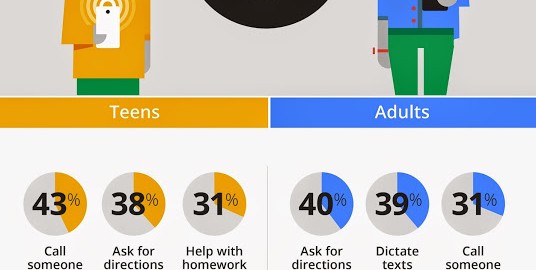Search is currently going through something of a transformation. As Google gets more sophisticated at understanding our search queries, the way we find information is becoming more intuitive and ‘human’. Online search has become a conversation, rather than an awkward keyword guessing game.
In addition, the stigma against talking to mobile devices in public appears to be subsiding. According to a Google survey of 1,400 Americans, 55% of teens and 41% of adults said that they are now using voice search more than once a day. The convenience, it seems, is just too good to pass up.

Okay Google – so what are the implications here for digital marketers? What will more intuitive voice searches and machine-human interaction bring to the marketing world? This article will examine three ways voice is shaping the online landscape, and provide advice to marketers who want to use new voice technologies to improve the customer experience.
Google Voice Search will shift keyword optimization
As searching for information becomes more natural and conversational, keyword optimization will have to change in order to fit in with the new long tail landscape. Voice search queries – being conversational – tend to be longer, more convoluted and more specific. Your site’s ranking and visibility will therefore depend on your ability to essentially read your consumer’s minds and anticipate their very precise long tail key phrases.
Optimizing for long tail keywords
One great technique to ensure your website is naturally optimized is to create an FAQ section, which demonstrates your expertise, and includes answers to all the long tail queries you can imagine your customers asking. Voice search engines will be looking for websites that provide the best and most specific responses for users: help yourself, and Google, by becoming the most relevant resource in your industry.
Optimizing for high volume keywords
This is not to say, however, that the high volume end of the spectrum will disappear from search – if anything, optimizing for your main keywords will become even more critical. Voice search engines want to be able to return a single answer to a user’s query, and so ranking anything below number one may condemn your organization to near irrelevance.
In order to avoid this, identify the theme on each page of your website and choose just one, or possibly two, shorter keywords that perfectly describe that page. For example, if your website has a “What We Do” page, make sure your keyword perfectly and concisely describes your business; or if your website has specific product pages, make sure the product branding features prominently in the page copy, and that information about the product is marked up with structured data. Basically, you want to focus all your SEO efforts on making sure each page ranks top for their assigned keyword(s).
Voice-based content will make branding more collaborative
As consumers get used to interacting with technology using voice, content marketing will become more of an interactive and human form of customer engagement. This is being driven by technology: together with the adoption of wearables and Internet of Things applications, content consumption is evolving to enable multiple forms of input and output, rather than simple keyboards and screens.
Currently, content is made for simply consuming, but as technology advances we will soon be creating more interactive content that encourages active involvement from the user. Using voice and gesture recognition is a cooperative, experiential approach to marketing, which can bring the consumer even closer to your brand.
 Voice Search Technology
Voice Search Technology
Some speculative advice for marketers looking to delve into this new format:
- Work on generating more collaborative, open-ended content. For example, instead of creating a video with a standard beginning, middle, and end, experiment with video formats that explore a specific premise, but can follow multiple different paths depending on user preferences.
- Begin collecting more data on your customers’ likes in order to focus your content marketing strategy. Learn what they like to talk about online and become a part of that conversation.
- Crowdsource ideas from your customer base. Ask those that engage with you about their opinions on a given subject, and perhaps give them a chance to suggest topics for discussion.
User tracking will continue to grow in sophistication and popularity
Online tracking software is already quite advanced, but with the growth of voice search (on mobile especially) one can expect to see a surge in offline engagement tracking as more customers go to ring up the contact center. Rather than putting up barriers to human contact, the online world is in fact beginning to facilitate more opportunities for real human interaction, meaning more marketers will need to begin integrating online and offline interactions.
The phone has historically been simultaneously one of the best and the worst ways to connect with consumers – on the one hand, a report from ResponseTap found that 66% of companies identify the call center as their highest quality lead source, however, on the other, the class of service provided over the phone is often shoddy and frustratingly bureaucratic (as many consumers will testify). Tracking users effectively from the initial mobile voice search, to the offline phone call, is the best way to ensure the contact center experience meets customer expectations.
“Visitor-level call tracking” software allows marketers to track every click along the customer journey (not just on a last click basis), giving them the opportunity to identify specifically which clicks prompt calls, from which ads and landing pages. Being able to track every online interaction means your contact center staff understand the customer’s needs before they click to call, and are therefore much more prepared to deliver excellent service.
(201)
Report Post




